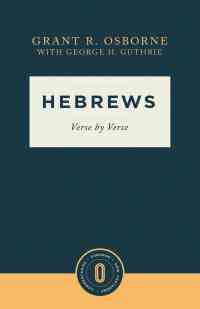Osborne, Grant R. and George H. Guthrie. Hebrews: Verse by Verse. Osborne New Testament Commentaries; Bellingham, Wash.: Lexham Press, 2021. 360 pp.; Pb. $19.99 Link to Lexham Press
Grant Osborne’s Verse by Verse commentary on Hebrews is the twelfth in the series and the first published after Osborne’s death in November 2018. The commentary was nearly complete when he died, missing only summary sections on chapters 10- 13, commentary on the final verses of chapter 13, and the introduction. Osborne requested Lexham allow George Guthrie to finish the commentary. As Guthrie explains in the preface, he followed Osborne’s original outline for the book of Hebrews, although he has a slightly different view (see his The Structure of Hebrews: A Textlinguistic Analysis, Brill, 1994; Baker, 1998). Even though George Guthrie is a well-known Hebrews scholar himself, the commentary belongs to Osborne.

Any commentary on Hebrews must deal with authorship of the anonymous letter. Osborne is clear: the author was not Paul (for the usual reasons). He suggests Apollos, although this cannot be known with certainty. We can know the author was well-educated, had synagogue training, had experiences in Jewish exegetical strategies, and was a concerned Christian minister who deeply cared about the congregation.
Regarding destination and date, Osborne argues the book was addressed to Rome (based on Hebrews 13:24, and similarities with 1 Clement). “Hebrews is profoundly Jewish” (7), although the original audience may have included God-fearing gentiles. The recipients of the letter struggled with persevering in the faith (as seen in the warning passages). Based on 5:11-6:3, Osborne dates the book of Hebrews after AD 49 (Claudius’s edict expelling Jews from Rome), but also before Nero’s persecution. Hebrews 12:9 implies the church has not yet suffered death. Osborne concludes “early to mid-60s AD” (9).
With respect to the purpose of Hebrews, he observes Hebrews is a complex and rich theological text, but it is also deeply pastoral. Perseverance in the Christian faith is in direct proportion to the clarity with which the reader understands who Jesus is and what Jesus has accomplished. If the readers really grasp Christ’s identity as the eternal son of God, the creator of the world, and the Lord of all that there is, the one who became incarnate and lived and died for us as our high priest and great sacrifice for sin, it will help an enduring in the Christian life (10).
A major issue for any commentary on Hebrews is the warning passages. Commenting on Hebrews 6:4-8, Osborne suggests members of house churches in Rome are guilty of indifference and low spiritual commitment. The author is afraid they may fall into total spiritual ruin and commit apostasy. The writer does not think they will, but a serious warning is in order. Typically, this passage is interpreted through a theological lens, whether Calvinist or Armenian. Osborne admits he is arguing one side of this debate, but also trying to be open and respectful towards the other side. He does not want to force his opinion on the reader but will provide data so the reader can decide for themselves (117).
He believes this passage teaches there is a final apostasy from which someone cannot possibly be redeemed. Apostasy is the “absolute rejection of Christ as Lord and Savior (121). All five of the blessings listed 6:4b-5 result from a “conversion to Christ” (119) and “define what it means to be a Christian” (121). “Have fallen away” is not a conditional sentence but rather a coordinate clause. The writer is not saying “if they should fall away” but pointing out what will happen when they fall away.
Regarding the warning passage in Hebrews 10:26-27, Osborne points out two factors that make this sin particularly heinous. The apostasy the author has in mind is both continuous and a deliberate, direct defiance of God. The person who has fallen into apostasy “obviously delights in thwarting God and persists,” turning the sin “from an act into a lifestyle” (219). Osborne relates the judgment described in 10:28-29 to someone in Israel who turned from God to worship idols, repudiating the God of Israel. According to Deuteronomy 13:8 and 17:1-6, the one who has turned to idols must be executed without mercy! Since the readers of Hebrews are under the new covenant, the penalty is much more severe, involving eternal, spiritual death (220).
The body of the commentary is divided into fifteen chapters following the outline in the commentary’s introduction (Hebrews 11 is divided between two chapters). The goal of the commentary series is to provide study notes for devotional reading or a small group Bible study. Chapters are brief and do not interact with secondary literature. There is a short bibliography of major commentaries for further study. Osborne’s comments are based on the English text of Hebrews, but he occasionally refers to Greek words (always appearing in transliteration). Uncommon terms appear in bold and are defined in a glossary (midrash, for example).
This makes the commentary readable for both academic readers, yet the layperson will have no trouble reading the commentary as they work their way through the book of Hebrews. Like other volumes in this series, Osborne achieves his goal of helping pastors to “faithfully exposit the text in a sermon.”
The Osborne New Testament Commentaries appear in both print and electronic Logos Library editions. Reviews of previous volumes:
- Luke
- Acts
- Romans
- Galatians
- 1 & 2 Thessalonians
- The Prison Epistles
- James
- Revelation
NB: Thanks to Lexham Press for kindly providing me with a review copy of this book. This did not influence my thoughts regarding the work.
A great read. I wish we would unravel the mystery about who the author of Hebrews was.